Call Us Today 972-608-0416 Plano office: Tollway & ParkerDallas office: 635 & Hillcrest
Hearing Aids
- Home
- Hearing Aids
Types of Hearing Aids
Pricing for most hearing aids today is determined by the type of hearing aid chosen and level of technology.-
Non-WirelessHearing Aids:
Are less expensive and can be made smaller due to the fact that they do not require the extra space for a wireless transmitter and receiver in the hearing aid.
-
Micro-Computer/DigitalHearing Aids:
Most newly manufactured hearing aids today utilize microchip technology with speech processors to improve speech understanding and reduce background noise.
-
AnalogHearing Aids:
Least expensive hearing aid on the market and are non-digital. These tend to be the least expensive hearing aids available today. They are simple analog amplifiers that amplify sounds much like the way a home/car stereo amplifier amplifies everything equally.
Custom Size/Style of Hearing Aids
-

Invisible
Invisible-in-canal (IIC) hearing aids are for mild to moderately severe hearing loss, completely invisible in most ears, and custom-made for you ear canal.
-

Completely-In-Canal
Completely-In-Canal (CIC) hearing aids are for mild to moderately severe hearing loss, virtually undetectable, and custom-made for your ear canal.
-

In-The-Canal
In-The-Canal (ITC) hearing aids are for mild to mildly severe hearing loss. Available in a variety of technology level selections that once required a larger aid. Custom-made for your ear canal, available in light brown, medium brown, chestnut and dark brown skin tones.
-

In-The-Ear
In-The-Ear (ITE) hearing aids are for mild to severe hearing loss, easy to adjust, custom-made for your ear canal. Available in light brown, medium brown, chestnut and dark brown skin tones.
Non-Custom Size/Style of Hearing Aids
-

Receiver-In-Canal
Receiver-In-Canal (RIC) hearing aids are for mild to severe hearing loss. Open fit design uses a small behind the ear device that delivers sound through a small speaker (receiver) that fits in the ear.
-

Micro Open Fit
Micro Open Fit hearing aids are for a mild to severe hearing loss. Open fit design uses a small behind the ear device that delivers sound through a small tube.
-

Behind-The-Ear
Behind-The-Ear (BTE) hearing aids are for moderate to severe hearing loss, no hard-to-use buttons or dials, discreet design, available in a variety of colors.
Hearing Aid Technology
Most Manufacturers will have 5 to 6 levels of technology. These levels typically dictate the price of the hearing aid. Ranging from lowest price (Entry) to highest price (Premium)Hearing Aid Manufacturers
-
Oticon hearing aid solutions for everyone Oticon Hearing Aids
Oticon Hearing Aids
Oticon hearing solutions are built on BrainHearing™ technology that is designed to support your brain’s natural process of making sense of sound. Through life-changing technology, we are able to provide solutions for all types of hearing loss, ages and lifestyles. Oticon designed their hearing aid solutions to meet your hearing needs and provide reliable, discreet and comfortable options — specifically for you! Learn more about Oticon
-
Life-changing hearing aid solutions Phonak Hearing Aids
Phonak Hearing Aids
Phonak continuously challenge the limits of technology to help overcome even the most difficult hearing situations – life-changing hearing solutions for more than 70 years. Have the freedom to do and go wherever you like, without having the restrictions associated with hearing loss. Achieve Hearing & Rehabilitation hearing aid solutions from Phonak automatically and effortlessly simplify your life while providing you with an exceptional hearing experience, everywhere, every time! Learn more about Phonak
 Starkey Hearing Aids
Starkey Hearing Aids
Hearing is key to our health and happinessStarkey is dedicated to delivering the best hearing experience possible — through the innovation of our products and the passion of their people. Achieve Hearing & Rehabilitation will help you sort through several factors that will determine which hearing aid will be the right one for you. They include the nature and severity of your hearing loss, your lifestyle and the activities you regularly enjoy, your job, your eyesight and dexterity, and the size and shape of your outer ear and inner ear canal. Learn more about Starkey
The Three Most Common Types of Hearing Loss
-
Conductive hearing loss occurs when there is a failure in the conduction of sound waves through the ear canal, eardrum, or middle ear. Something is blocking the transmission of sound to the nerve of hearing. This can be caused by a variety of factors, including: wax impaction, ear canal infection-fungus or object in the canal, ruptured ear drum, fluid behind the eardrum or middle ear infection. Conductive hearing loss usually involves a reduction in sound level, or the ability to hear faint sounds. This type of hearing loss can often be medically or surgically corrected. Conductive hearing loss
Conductive hearing loss
-
Sensorineural hearing loss occurs when there is damage to the inner ear (cochlea) or to the nerve pathways from the inner ear (retrocochlear) to the brain. Sensorineural hearing loss cannot be medically or surgically corrected. It is a permanent loss. Sensorineural is a type of hearing loss in which the root cause lies in vestibulocochlear nerve, the inner ear, or central processing centers of the brain. Sensorineural hearing loss can be mild, moderate, or severe, including total deafness. Sensorineural hearing loss
Sensorineural hearing loss

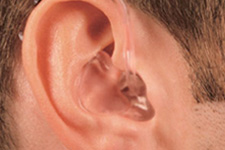
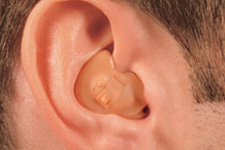
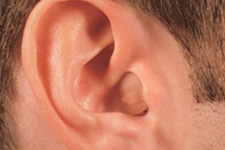
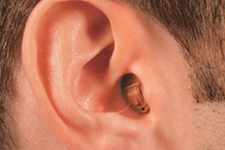
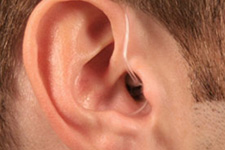
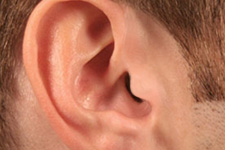
 Mixed hearing loss
Mixed hearing loss